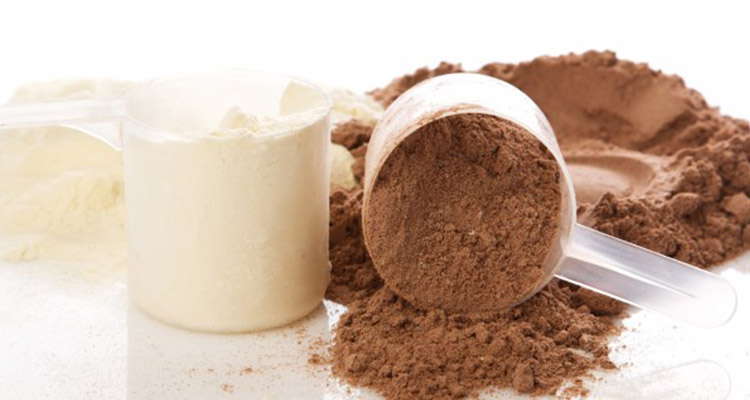Is creatine an ergogenic substance or a modern-day nootropic? There’s often a fine line between the two. Some herbs and adaptogens that we learned to use for physical performance from traditional Chinese and Ayurvedic medicine are more popular today for boosting brain function, while some of the synthetically derived chemicals that have become available in recent decades were developed as brain-altering nootropics but were later found to enhance athletic performance as well.
Here’s a rundown on six of the hottest supplements that we now know offer ergogenic as well as cognitive-enhancing effects. For an in-depth discussion of dosing principles, read this.
1. Creatine
Creatine, most commonly sold as creatine monohydrate, is the classic example of an ergogenic substance with other benefits. Bodybuilders and strength athletes have long used creatine to support muscle size and strength, but the same mechanism that does that also supports the brain.
Creatine helps cells regenerate energy in the form of ATP more rapidly, which can increase training volume and also positively affects cognition.[1] Vegans, vegetarians, the elderly, and females who don’t get enough protein and creatine in their diet are most likely to respond favorably to creatine supplementation.[2] Research indicates that when subjects take 5 grams of creatine per day for prolonged periods of time, or with creatine-loading doses of 5 grams four times a day for seven days, creatine supplementation can help improve cognitive performance. The effects are particularly significant when the brain is severely taxed, such as in response to sleep deprivation, during extremely demanding cognitive tasks (assessing and solving complex problems), or when oxygen availability is low (high altitudes, deep water diving, or poor oxygen-rich blood flow to the brain such as occurs with people on blood thinners or the elderly).[1,3]*
 ://www.bodybuilding.com/images/2020/march/6-supplements-that-aid-brain-function-as-well-as-performance-1-700xh.jpg”/>
://www.bodybuilding.com/images/2020/march/6-supplements-that-aid-brain-function-as-well-as-performance-1-700xh.jpg”/>
2. Caffeine
Caffeine is the world’s most consumed stimulant because of its presence in coffee, tea, and soda. It’s also ubiquitous in sports nutrition pre-workout products, energy drinks, and nootropics.
Caffeine supplementation has been shown to improve reaction time, concentration, alertness, and decision-making, and it can also improve mood.
Despite those cognitive benefits, most fitness enthusiasts use caffeine for its effects on physical performance. It can increase power output, strength, and training volume, and delay the onset of fatigue.[4]*
Caffeine supplementation can have significant effects when you’re sleep deprived or exercising to fatigue.[5] Is it any wonder that caffeine is the go-to ingredient in nearly all things sports-related and that it’s banned in high doses by the World Anti-Doping Association (WADA)?
Whereas one cup of coffee can help clear the morning cobwebs and improve your focus, drinking an entire pot of coffee can lead to increased anxiety, nervousness, and irritability. As with many stimulants, the use of caffeine follows a bell-shaped curve, in which there’s an optimal level of caffeine that enhances both physical readiness and cognitive performance; too much of a good thing, and the benefits can be replaced by effects that are counterproductive.[6]
3. L-Carnitine
Acetyl-L-carnitine is a naturally occurring derivative of the amino acid L-carnitine, which is responsible for shuttling fatty acid CoAs into the cell mitochondria to generate ATP. The acetylated form of carnitine has become particularly popular as a nootropic because of its reported role in neuroprotection, specifically, its antioxidant-like role in protecting mitochondria from the adverse effects of physiological stress due to strenuous exercise, aging, toxins, etc.[7]
 ://www.bodybuilding.com/images/2020/march/6-supplements-that-aid-brain-function-as-well-as-performance-2-700xh.jpg”/>
://www.bodybuilding.com/images/2020/march/6-supplements-that-aid-brain-function-as-well-as-performance-2-700xh.jpg”/>
For example, a number of animal studies suggest that acetyl-L-carnitine can enhance nerve growth factor and improve mitochondrial function following physiological stress or injury, and the acetyl group can be used for energy or as a precursor of acetylcholine and other amino acid neurotransmitters within the brain; for example, GABA and glutamate. ://www.bodybuilding.com/images/2020/march/6-supplements-that-aid-brain-function-as-well-as-performance-3-700xh.jpg”/>
Other evidence points to a more direct application to physical performance. For example, the consumption of 500 milligrams per day of Sensoril for 12 weeks by recreationally active men significantly improved strength and power, time trial performance, and perceived recovery from exhaustive exercise.[11] Another exercise study, in which subjects took 600 milligrams per day of KSM-66 brand ashwagandha for eight weeks, observed significant increases in both muscle size and strength when they used the herb in combination with a resistance training program.[14]*
6. Exogenous Ketones (Ketone Esters)
Nootropic enthusiasts have fallen in love with the ketogenic diet, but the majority of consumer and retail interest focuses on use of supplemental ketones for physical performance. That means exogenous ketone esters, not made in the body, as opposed to increasing the body’s production and use of ketones by following a strict ketogenic diet as an alternative fuel to replace glucose.
One study reported that consuming approximately 260 milligrams of ketone esters per pound of body weight (about 45.5 grams of ketone esters for a 175-pound adult), in addition to carbohydrates, prior to 90 minutes of cycling, increased endurance performance by about 2-3 percent in the final 30-minute time trial.[15] The combination of ketone esters plus carbs also lowered blood lactate and decreased protein breakdown. The most beneficial use of supplemental ketones may be as an alternative fuel source when you’re trying to limit carbohydrate intake, and in combination with resting conditions or moderate-intensity endurance exercise.[16]
Skeletal muscle, though it makes up the greatest total mass in most athletes, isn’t the biggest consumer of energy in your body. That mess of a brain, which may be only 2 percent of your total body weight (seemingly, much smaller for some), is in fact an energy-consuming maniac. That explains why your body was designed with an efficient back-up plan for when glucose (the energy currency from carbohydrates) isn’t available and why it gets its fuel from a number of sources. Whenever ketones are presented to your brain, they are taken up and used for energy. A recent study showed that not only are these alternative fuel molecules used efficiently by the brain, but making them available—either through ketogenic dieting or supplemental ketones—may stabilize brain function and help reduce the age-associated decline common in those who eat a carbohydrate-based diet.[17]*
*These statements have not been evaluated by the Food and Drug Administration. This product is not intended to diagnose, treat, cure, or prevent any disease.
References
- Dolan, E., Gualano, B., & Rawson, E. S. (2019) Beyond muscle: the effects of creatine supplementation on brain creatine, cognitive processing, and traumatic brain injury. European Journal of Sport Science, 19(1), 1-14.
- Rae, C., Digney, A. L., McEwan, S. R., & Bates, T. C. (2003). Oral creatine monohydrate supplementation improves brain performance: a double-blind, placebo-controlled, cross-over trial. Proceedings of the Royal Society of London. Series B: Biological Sciences, 270(1529), 2147–2150.
- McMorris, T., Harris, R.C., Howard, A.N., Langridge, G., Hall, B., Corbett, J., Dicks, M. and Hodgson, C. (2007). Creatine supplementation, sleep deprivation, cortisol, melatonin and behavior. Physiology & Behavior, 90(1), 21-8.
- Goldstein, E.R., Ziegenfuss, T., Kalman, D., Kreider, R., Campbell, B., Wilborn, C., Taylor, L., Willoughby, D., Stout, J., Graves, B.S. and Wildman, R. (2010) International society of sports nutrition position stand: caffeine and performance. Journal of the International Society of Sports Nutrition, 7(1), 5.
- Meeusen, R., Roelands, B., & Spriet, L. L. (2013). Caffeine, exercise and the brain. In Limits of Human Endurance (Vol. 76, pp. 1-12).
- Wood, S., Sage, J. R., Shuman, T., & Anagnostaras, S. G. (2014). Psychostimulants and cognition: a continuum of behavioral and cognitive activation. Pharmacological Reviews, 66(1), 193-221.
- Ferreira, G. C., and McKenna, M. C. (2017). L-carnitine and acetyl-L-carnitine roles and neuroprotection in developing brain. Neurochemical Research, 42(6), 1661-75.
- Malaguarnera, M., Gargante, M.P., Cristaldi, E., Colonna, V., Messano, M., Koverech, A., Neri, S., Vacante, M., Cammalleri, L. and Motta, M. (2008). Acetyl L-carnitine (ALC) treatment in elderly patients with fatigue. Archives of Gerontology and Geriatrics, 46(2), 181-90.
- Punja, S., Shamseer, L., Olson, K., & Vohra, S. (2014). Rhodiola rosea for mental and physical fatigue in nursing students: a randomized controlled trial. PloS one, 9(9), e108416.
- 10. Ng, Q. X., Loke, W., Foo, N. X., Tan, W. J., Chan, H. W., Lim, D. Y., & Yeo, W. S. (2019). A systematic review of the clinical use of Withania somnifera (Ashwagandha) to ameliorate cognitive dysfunction. Phytotherapy Research.
- Ziegenfuss, T. N., Kedia, A. W., Sandrock, J. E., Raub, B. J., Kerksick, C. M., & Lopez, H. L. (2018). Effects of an aqueous extract of Withania somnifera on strength training adaptations and recovery: The STAR Trial. Nutrients, 10(11), 1807.
- Pingali, U., Pilli, R., & Fatima, N. (2014). Effect of standardized aqueous extract of Withania somnifera on tests of cognitive and psychomotor performance in healthy human participants. Pharmacognosy Research, 6(1), 12.
- Salve, J., Pate, S., Debnath, K., & Langade, D. (2019). Adaptogenic and Anxiolytic Effects of Ashwagandha Root Extract in Healthy Adults: A Double-blind, Randomized, Placebo-controlled Clinical Study. Cureus, 11(12).
- Wankhede, S., Langade, D., Joshi, K., Sinha, S. R., & Bhattacharyya, S. (2015). Examining the effect of Withania somnifera supplementation on muscle strength and recovery: a randomized controlled trial. Journal of the International Society of Sports Nutrition, 12(1), 43.
- Cox, P.J., Kirk, T., Ashmore, T., Willerton, K., Evans, R., Smith, A., Murray, A.J., Stubbs, B., West, J., McLure, S.W. and King, M.T. (2016). Nutritional ketosis alters fuel preference and thereby endurance performance in athletes. Cell Metabolism, 24(2), 256-68.
- Shaw, D. M., Merien, F., Braakhuis, A., Maunder, E. D., & Dulson, D. K. (2019). Effect of a Ketogenic Diet on Submaximal Exercise Capacity and Efficiency in Runners. Medicine and Science in Sports and Exercise, 51(10), 2135-2146.
- Mujica-Parodi, L.R., Amgalan, A., Sultan, S.F., Antal, B., Sun, X., Skiena, S., Lithen, A., Adra, N., Ratai, E.M., Weistuch, C. and Govindarajan, S.T. (2020). Diet modulates brain network stability, a biomarker for brain aging, in young adults. Proceedings of the National Academy of Sciences, 117(11), 6170-6177.
Gym2k.com Articles






Leave a Reply
You must be logged in to post a comment.